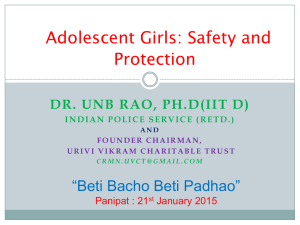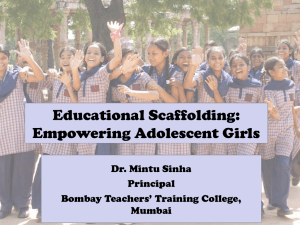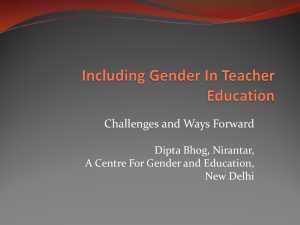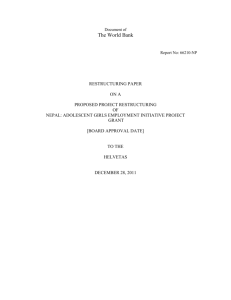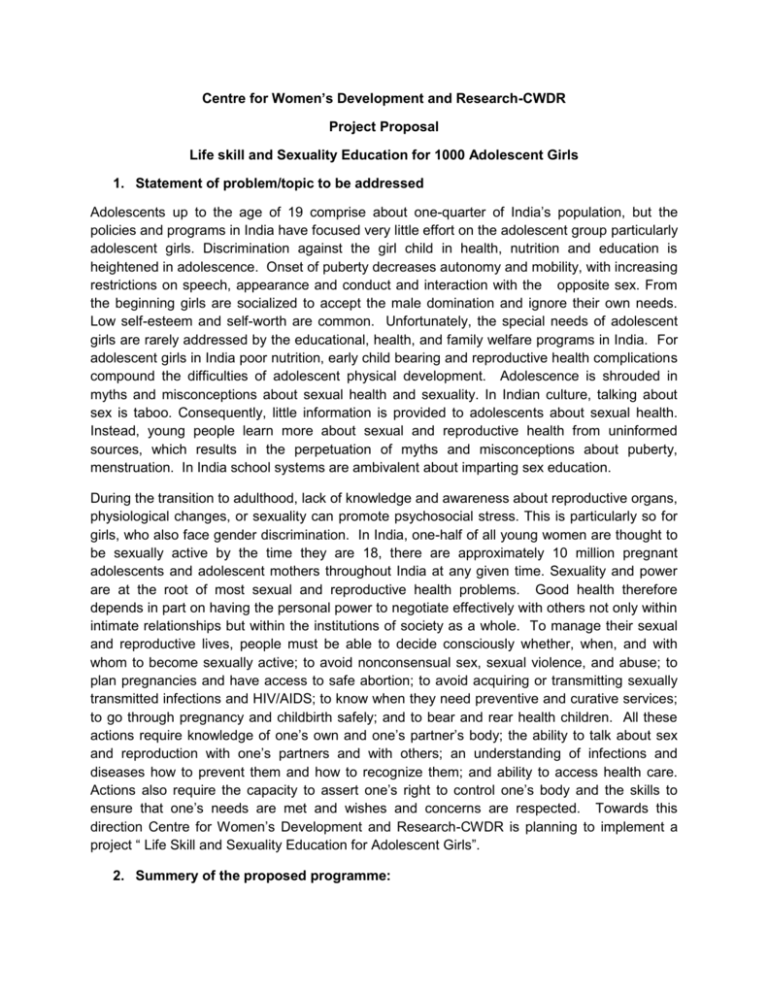
Centre for Women’s Development and Research-CWDR
Project Proposal
Life skill and Sexuality Education for 1000 Adolescent Girls
1. Statement of problem/topic to be addressed
Adolescents up to the age of 19 comprise about one-quarter of India’s population, but the
policies and programs in India have focused very little effort on the adolescent group particularly
adolescent girls. Discrimination against the girl child in health, nutrition and education is
heightened in adolescence. Onset of puberty decreases autonomy and mobility, with increasing
restrictions on speech, appearance and conduct and interaction with the opposite sex. From
the beginning girls are socialized to accept the male domination and ignore their own needs.
Low self-esteem and self-worth are common. Unfortunately, the special needs of adolescent
girls are rarely addressed by the educational, health, and family welfare programs in India. For
adolescent girls in India poor nutrition, early child bearing and reproductive health complications
compound the difficulties of adolescent physical development. Adolescence is shrouded in
myths and misconceptions about sexual health and sexuality. In Indian culture, talking about
sex is taboo. Consequently, little information is provided to adolescents about sexual health.
Instead, young people learn more about sexual and reproductive health from uninformed
sources, which results in the perpetuation of myths and misconceptions about puberty,
menstruation. In India school systems are ambivalent about imparting sex education.
During the transition to adulthood, lack of knowledge and awareness about reproductive organs,
physiological changes, or sexuality can promote psychosocial stress. This is particularly so for
girls, who also face gender discrimination. In India, one-half of all young women are thought to
be sexually active by the time they are 18, there are approximately 10 million pregnant
adolescents and adolescent mothers throughout India at any given time. Sexuality and power
are at the root of most sexual and reproductive health problems. Good health therefore
depends in part on having the personal power to negotiate effectively with others not only within
intimate relationships but within the institutions of society as a whole. To manage their sexual
and reproductive lives, people must be able to decide consciously whether, when, and with
whom to become sexually active; to avoid nonconsensual sex, sexual violence, and abuse; to
plan pregnancies and have access to safe abortion; to avoid acquiring or transmitting sexually
transmitted infections and HIV/AIDS; to know when they need preventive and curative services;
to go through pregnancy and childbirth safely; and to bear and rear health children. All these
actions require knowledge of one’s own and one’s partner’s body; the ability to talk about sex
and reproduction with one’s partners and with others; an understanding of infections and
diseases how to prevent them and how to recognize them; and ability to access health care.
Actions also require the capacity to assert one’s right to control one’s body and the skills to
ensure that one’s needs are met and wishes and concerns are respected. Towards this
direction Centre for Women’s Development and Research-CWDR is planning to implement a
project “ Life Skill and Sexuality Education for Adolescent Girls”.
2. Summery of the proposed programme:
The idea is to design, test and implement models of life-skill and sexuality education
programmes targeting adolescent girls from rural and urban areas and share it among other
NGOs and Educational institutions. Also create a network for the empowerment of adolescent
girls and involve in advocacy, lobbying and campaign activities to bring in relevant policies and
programmes for the adolescent girls.
3. Project Description
We have already initiated an association for adolescent girls “Snehidhi” in our working area all
the activities will be implemented and monitored through ‘Snehidhi’
Recreational learning Resource centres: We are planning to have 2 learning resource
centres for adolescent girls one in rural area one in Chennai city slums. The centers will have
computers, sewing machines, library, play materials, Musical instruments. We will also use
internet, cell phone and DVDs to educate adolescent girls. Adolescent girls can come at any
time use the centre to learn, they can also borrow books and play materials. In addition to that
we will organize programmes to motivate adolescent girls to involve in community development
activities. One of the activities will be mentoring younger children, that each school going
adolescent will adopt/mentor a younger child and monitor the health and education of the child,
they will also help the school going children by providing tuition classes. The learning resource
centers will also organize special pre-examination camps to help the girls who are in 8th, 9th and
10th standards particularly in English, Mathematics and Science, in these subject only most girls
fail and discontinue their studies. The learning resource center will organize exhibitions and
exposure visits to expose the girls about the different career options available to them. We will
also organize art, music, dance and street theatre workshops once in a year and use the team
to educate the community. Nearly 1000 adolescent girls will benefit from the learning resource
centers, this would help them continue their education, motivate them to involve in community
development, make personal decisions based on the information and learning from the centre.
Life skill, sexuality education workshops for adolescent girls: We will organize regular
weekend workshops on life skill and sexuality education for adolescent girls. They will learn the
core life skills like the ability to -Make decisions, solve problems and think critically and
creatively, Clarify and analyze values, Communicate, including listen, build empathy, be
assertive and negotiate, Cope with emotion and stress, Feel empathy with others and be selfaware.
As part of sexuality education they learn about Human Development - Reproductive Anatomy
and physiology, Reproduction, Puberty, Body Image, Sexual Orientation and identity.
Relationships-Families, Friendship, Love, Marriage and lifetime commitments, Raising children.
Personal Skills- Values, Decision making, communication, Assertiveness, Negotiation, Looking
for help. Sexual Behavior -Sexuality throughout life, masturbation, abstinence, Human Sexual
responses, Fantasy, sexual Dysfunction. Sexual Health - Contraception, Abortion, Sexually
Transmitted Infections, HIV Infection. Society and Culture- Sexuality and Society, Gender
Roles, Sexuality and the Law, Sexuality and Religion, Reproductive rights, Sexuality and the
Media.
Each adolescent girls has to attend 10 days of weekend workshops to complete the training in
life skills and sexuality education. We will be conducting 8 such 10 days weekend workshops,
200 adolescent girls will benefit from these trainings.
We will also organize 2-3 days life skill and sexuality education workshops in schools, We will
organize such workshops in 10 schools and 500-600 adolescent girls will benefit from this. In
addition to that girls will also learn computer skills and use of internet for further learning, we will
also use mobile phones and digital media(video and photos) to reinforce their learnings.
Desired outcome: Nearly 1000 adolescent girls will directly benefit from this programme and
learn life skill and sexuality education, they will continue their education, and marry after 18
years the official marriage year set by the government. Nearly 25000 adolescent girls will
benefit from our website www.snehidhi.com.
Centre for Women’s Development and Research-CWDR: CWDR is a grass root level NGO
promotes women’s rights, leadership and empowerment through issue based campaigns and
community level activities. CWDR was initiated during 1993 by three women activists when
they realized that only 2% of the development organizations are headed by women, CWDR was
formed out of the belief that women managed organizations are best suited to address the
gender specific problems of women.
Vision: Creating a gender just society,
Mission: Facilitating a women’s movement to achieve human rights for women.
We are registered as a trust, we are also registered as a Charitable trust under the Income tax
act and income tax exempted. CWDR is also registered under the FCRA-Foreign Contributions
Regulation Act with Ministry of Home Affairs, Government of India. We are working in 83 slums
of Chennai city and 24 villages of Kancheepuram district, Tamilnadu. We have also initiated
state level network for Domestic workers. We are a team of 45 staff members all are women
out of which 7 are coordinators who are postgraduates in social work or related fields.
CWDR’s field level activities focus on three highly vulnerable groups of women: Adolescent
girls, single women and domestic workers. CWDR has organized women domestic workers into
a trade union ‘Manushi’ which works for the rights of women domestic workers. Manushi
members have provided leadership in the struggle to achieve adequate recognition for the work
of women domestic workers. Manushi actively advocates for government regulation of domestic
work. CWDR is organizing single women as ‘Maithri’ self help groups. Through Maithri CWDR
aims to expand access to income generation opportunities, provide a support network for the
women and increase exposure and awareness of the unique challenges of single women.
‘Snehidhi’ is an association for adolescent girls initiated by CWDR. Snehidhi provides life skill
and sexuality education, sexual abuse awareness and prevention trainings, vocational skill
trainings like computer skills, dress making, handicrafts, Trainings in folk music, dance and
drama, Supplementary education support and leadership trainings.
BUDGET
S.No
1
Budget Head
Rupees
Weekend workshops on lifeskill, sexuality education 24,00,000
and supplementary education
(US$40,000)
Rs.2400 ( 5 weekend workshops, learning
materials, honorarium for resource person,
computer skill training, career guidance and
counseling service for one adolescent girl,
Recreational learning centre running expenses) X
1000 girls


